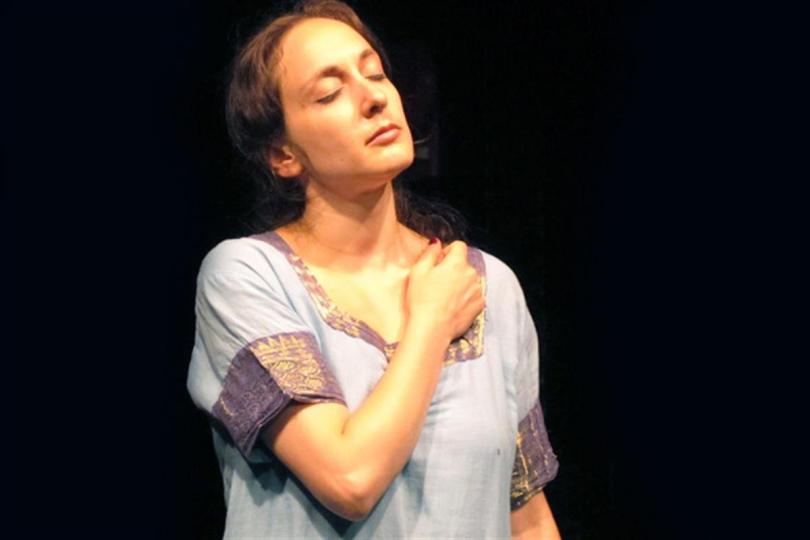Death by Fringe! The Jew in The Ashram

Day two for me. So far so good--the open-minded appeal of the Fringe hasn’t broken me down. Although it’s worth mentioning, the amount of men I’m seeing in jorts is a little grating. Besides that, it’s good theater all around. My second show of the Fringe is The Jew in the Ashram a solo (one person) show held in the Ritz theater. This piece asked me to take in so much and, in the end, I was thankful for it.
Directly communicating with the audience, Amanda Miller’s The Jew in The Ashram is a recollection of her time at an ashram. It is there that she learns to become a yoga teacher. Outside of her comfort zone and motivated by the spirituality of yoga, Miller openly recalls past moments of her life that relate with the religion she abandoned. Flashbacks of her family’s struggle accompany interesting moments of her education all culminate with Miller becoming a yoga teacher.
The solo performance of Amanda Miller grabs ahold of your emotions, body, and provides a nerve-wracking sense of morality. Amanda is the sole performer and her incredible acting introduces us to a multitude of characters from India, New York, and exotic New Jersey. Like prisms, the varied players in Amanda’s life show how intersecting individuals have added together to make the anxious woman we’re seeing on stage. The performance shows the different methods the artist has employed, as well as how outside instigators have transformed her life. Some changes were painful and daunting, slow and unknown, or quick and forced. We follow these moments in flashbacks while simultaneously following the story of how Amanda became a yoga teacher in an ashram in India.
Like most gentiles, I don’t love referring to Jewish people as Jews. But that isn’t the case for Amanda--she throws the word around as she comes to terms with her religion/cultural identity in her pursuit of becoming a yoga instructor. We see Miller’s religion move in and out of her life as she takes on the roles of her grandmother (a polish immigrant who escaped an internment camp during the Second World War) and her father (a chronic smoker who has trouble understanding his child). Both of these people don’t berate Miller with her Judaism as so much as remind her of its bonding and healing abilities. Anxieties stemming from childhood trauma force Miller to attempt finding a sense of self in her neglected religion. The healing of the religious self occurs in the ashram while reminiscing on her father’s funeral, her grandmother’s faith in the aftermath of the war, and in Miller’s new friendship with a woman she meets in the ashram. All of these moments revolve around her connection to Judaism.
Her faith, identity, and growth as a person unfold slowly enough that you might not notice them. Because of Miller’s, let’s call it crowd work, the audience is in a perpetual state of mindfulness thanks to some beginner yoga you can do in your chair and many small moments of cleansing breath. The show flows through you, eager to have you recognize parts of yourself as the woman in front of you neurotically soldiers through a difficult journey. The Jew in the Ashram would totally hypnotize with its rich gumbo of emotion and methodical physicality if not for one glaring question you’ll keep asking yourself: Is this appropriate?
Listen, these are modern times with modern ideas and one of them is the concept of cultural appropriation. You’re going to be asking yourself if that’s happening in this show a lot. Miller affects a voice and costume when performing as the only Indian character in the show. It doesn’t help that besides Miller herself, this Indian woman is the only comic relief. Her journey in the ashram is real, the audience is witnessing a memory of this, that memory belongs to Miller, but the culture she’s recalling isn’t her own. If you ask me, I think the voice was a bit much, but then again it might be a spot-on impression. Overall I think the show is okay in this regard, but I wouldn’t be surprised if an Indian reviewer had differing ideas on the matter.
It’s a little too close to call and that pulls you out of the experience. This show has everything you want from the Fringe. It tells a story we couldn’t find in our community. It’s well-versed in cultural identity. It has a perfect dash of audience participation. But it also has a white lady talking about something that doesn’t belong to her, and that feels weird. It also has a lot of things that do belong to her and the two don’t entirely mix. Ideally, the teachings of yoga and Judaism would blend into a nuanced concept that we call Miller-- or at least the cure for her anxiety and existentialism--but they curdle in your mind. Every sincere sequence comes with an internal echo that cries out in cynicism. It also doesn’t help that Miller has self-deprecating jokes that make questioning her experience almost reflexive.
For all of those that see this show here’s what I’m going to suggest: steer into the skid. Ask yourself if it’s okay and make the question a post-production of the show. Meditating on this will be easy after the final blackout and the people in your life will have differing ideas on it. In a sense, this is what The Jew in The Ashram is about: questioning what is okay and how personal discovery can answer that.
I’m glad I went to the show. I learned as much as I felt both during and after it. If you’re interested in seeing someone grow out of once was I suggest you see this performance.




